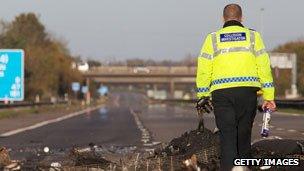Who, what, why: Would raising the motorway speed limit make pile-ups worse?
- Published

The M5 was closed for two days following the 34 car crash
The motorway speed limit may still be raised to 80mph despite the M5 crash in which seven people were killed and 51 injured. But would the extra 10mph make piles-ups worse?
The government wants to increase the motorway speed limit from 70mph to 80mph. Already widely debated, the move will be under even more scrutiny following Friday's crash on the M5 in Somerset. The 34-vehicle pile-up is the worst in the UK since 1991.
When announcing the possible change the then transport secretary, Philip Hammond, said the current limit - introduced in 1965 - was out of date due to "huge advances in safety and motoring technology".
But would increasing the speed limit by 10mph make motorway crashes worse?
Basic physics dictates the faster you're travelling, the greater the impact if you suddenly come to a stop. While speed does not necessarily cause a crash, "it is true to say that it can greatly increase its severity", says the director of the RAC Foundation, Prof Stephen Glaister.
For road safety experts trying to work out the potential outcomes of road accidents at 80mph, many things need to be examined. As well as speed these include the vehicle's condition, weight, contents and the weather and road conditions. All play a part.
Dr Lisa Jardine-Wright, a physicist at the Cavendish Laboratory, based at Cambridge University, says a major factor when increasing the speed of a car by 10mph is the stopping distance. It will increase from 96m (315ft) to 120m (394ft).
When using a Ford Focus as the standard, this means the stopping distance at 70mph is 22 car lengths and at 80mph it is nearly 28 car lengths. So, according to Jardine-Wright's calculations, if a driver travelling at 80mph leaves a stopping distance designed for 70mph they will collide with the vehicle in front at nearly 40mph.
If a vehicle was brought to an immediate halt the force that a passenger or driver travelling in that vehicle would feel from the seatbelt would be 33% more at 80mph than at 70mph. Prof Glaister says this isn't a problem until you hit something and "then suddenly all that energy has to go somewhere".
"Unfortunately, depending on the design of the car and the type of impact, much of it will be absorbed by the human body."
Of course accidents on motorways rarely involve a single car. Jardine-Wright predicts, using a simplified calculation, that if a car travelling at 70mph and not slowing down were to hit a line of closely-spaced stationary traffic, three cars in front would be affected.
At 80mph there is a reasonable probability that a further car would be involved, she says. The impact of more vehicles caught up in an incident could mean an increase in casualties.
A report by the Transport Research Laboratory, external found that if the motorway speed was increased by 10mph, the change could cause an extra 18 deaths per year.
The Department of Transport says an initial impact assessment of the policy shows fatalities may increase by 1% per year. It is still in the process of examining all potential impacts caused by the speed increase, including those on the environment and on business.
In general speed does two things, says Duncan Vernon, road safety manager for the Royal Society for the Prevention of Accidents (Rospa).
"Higher speeds result in higher-speed crashes and this can increase the severity of injuries. It also increases the risk of accidents happening. It exaggerates other errors, like following vehicles closely at higher speeds, which can lead to an accident."
He adds that a lot of drivers agree that 70mph is a suitable speed, as they are not so comfortable driving past 80mph.
Road safety charity Brake is fully against the proposal calling it "desperately inhumane". It says the 10mph change could increase casualties by some 5 to 10%.
But the Institute of Advanced Motorists (IAM) is in favour of the increase, saying motorway users currently break the 70mph limit anyway. It wants the speed limit increased so that everyone does that speed, arguing this means motorways can be better managed.
"It's really about trying not to have an accident in the first place," say Peter Rodger, chief examiner for IAM. "Whatever speed someone does has consequences and it can be a matter of inches or luck."
It is still worth bearing in mind that "motorways are our safest roads", says Prof Glaister.
"But when something does go wrong then the volume of traffic and the associated speeds can result in the situation we tragically saw on the M5."